The software development landscape has been revolutionized by artificial intelligence, with AI coding assistant tools becoming essential for modern developers. These intelligent tools now handle everything from code completion and bug detection to generating entire functions from natural language prompts, dramatically enhancing developer productivity and code quality.
In this comprehensive guide, we’ll explore the top 15 AI coding assistant tools of 2025, analyzing their features, strengths, limitations, and ideal use cases. Whether you’re a solo developer, part of a large enterprise team, or somewhere in between, this comparison will help you identify the perfect AI coding companion for your specific needs.
How We Selected These AI Coding Tools
Our evaluation of the best AI coding assistant tools is based on several critical factors that determine their practical value in real-world development environments:
Selection Criteria
- Code Quality: How accurate and reliable are the code suggestions?
- Language Support: Which programming languages and frameworks are covered?
- Integration: How well does it work with popular IDEs and development environments?
- Learning Capability: Does the tool adapt to your coding style and improve over time?
- Privacy & Security: How is your code data handled and protected?
- Pricing Structure: Is there a free tier? How does pricing scale with usage?
- User Experience: How intuitive and helpful is the interface?
- Performance Impact: Does it slow down your development environment?
Why AI Coding Assistants Matter in 2025
Today’s AI coding tools leverage advanced large language models to understand context, project structure, and coding patterns at unprecedented levels. The best tools don’t just complete lines of code—they understand entire codebases, suggest architectural improvements, and help maintain consistent coding standards across teams.
Stay Updated on AI Development Tools
Join our newsletter to receive the latest insights on AI coding tools, implementation strategies, and best practices delivered straight to your inbox.
AI Coding Assistant Tools: Quick Comparison
Before diving into detailed reviews, here’s a side-by-side comparison of the top AI coding assistant tools to help you quickly identify which options might best suit your needs:
| Tool | Best For | Integration | Pricing | Key Feature |
|---|---|---|---|---|
| GitHub Copilot | General-purpose coding | VS Code, Visual Studio, JetBrains | $10/month | Real-time code suggestions |
| Tabnine | Privacy-focused teams | Most major IDEs | Free – $12/month | Local AI models option |
| Cursor AI | Collaborative coding | Standalone IDE | Free – $20/month | AI-powered code editing |
| Sourcegraph Cody | Large codebases | VS Code, JetBrains | Free – $9/month | Cross-repository insights |
| Replit | Quick prototyping | Browser-based | Free – $10/month | Ghostwriter AI assistant |
| Amazon Q Developer | AWS developers | VS Code, JetBrains, CLI | Free – $19/month | AWS ecosystem integration |
| Windsurf | Advanced coding workflows | Standalone IDE | Free – $15/month | Cascade Agent technology |
| Qodo Gen | Test-driven development | VS Code, JetBrains | Free – $19/month | Automated test creation |
| Gemini Code Assist | Google Cloud developers | VS Code, Cloud Shell | Free – Enterprise | Code citation feature |
| Aider | Terminal-based workflow | CLI, Git | Free (API costs) | Multi-file editing |
| Continue.dev | Customizable AI assistance | VS Code, JetBrains | Free – $10/month | Custom AI assistants |
| JetBrains AI Assistant | JetBrains IDE users | JetBrains IDEs | Subscription-based | IDE-native integration |
| CodeMate | Code quality focus | VS Code, Web | Free – Premium | Real-time error detection |
| OpenHands | Full-stack development | VS Code, Web | Free (open-source) | Comprehensive dev capabilities |
| Cline | Task-oriented coding | VS Code | Free (open-source) | Plan and Act modes |
Note: Pricing information is current as of May 2025 and may change. Many tools offer free trials or limited free tiers to test functionality before committing to a paid plan.
1. GitHub Copilot
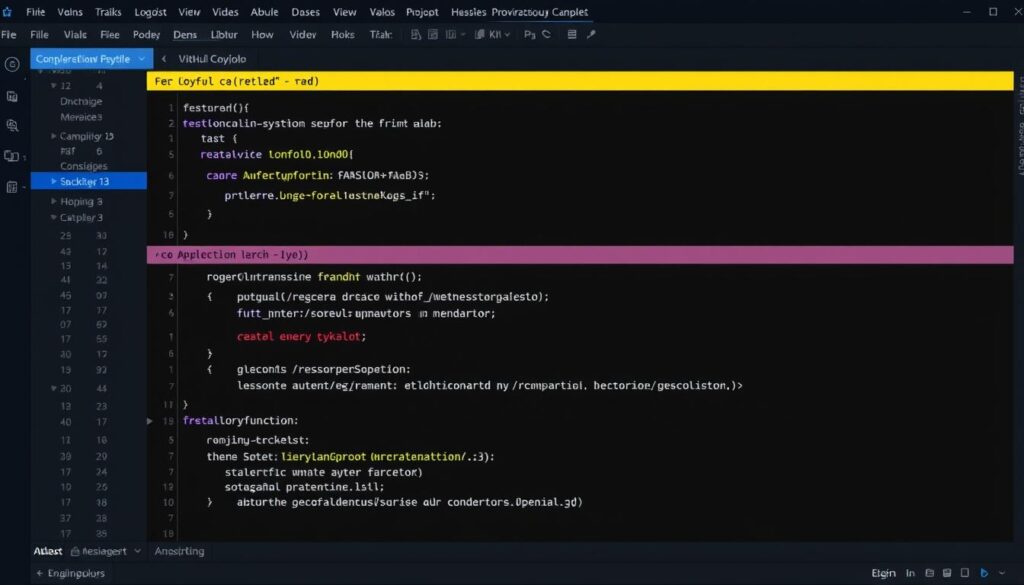
GitHub Copilot, developed in collaboration with OpenAI, remains one of the most widely adopted AI coding assistants in 2025. This tool has evolved significantly since its initial release, now offering more than just code completion.
Key Features
- Intelligent Code Generation: Suggests entire functions and code blocks based on comments and context
- Multiple Language Support: Works with Python, JavaScript, TypeScript, Ruby, Go, and many other languages
- GitHub Copilot Chat: Interactive chat interface for natural language coding queries
- IDE Integration: Seamlessly works with Visual Studio Code, Visual Studio, JetBrains IDEs, and Neovim
- Context Awareness: Understands your project structure and coding patterns
- Test Generation: Can create unit tests based on your implementation code
Pricing
- Individual: $10 per month or $100 per year
- Business: $19 per user per month
- Enterprise: Custom pricing
- Free for: Students, teachers, and verified open-source maintainers
Strengths
- High-quality code suggestions based on vast training data
- Excellent IDE integration experience
- Regular updates and improvements
- Strong community and support
- Free for educational and open-source use
Limitations
- Requires internet connection for all operations
- Code privacy concerns for some organizations
- Can occasionally suggest deprecated or insecure patterns
- Limited customization options
Best For: GitHub Copilot excels for individual developers and teams who want a reliable, well-integrated AI coding assistant with minimal setup. It’s particularly valuable for those working across multiple programming languages and frameworks.
Official Website: https://github.com/features/copilot
2. Tabnine
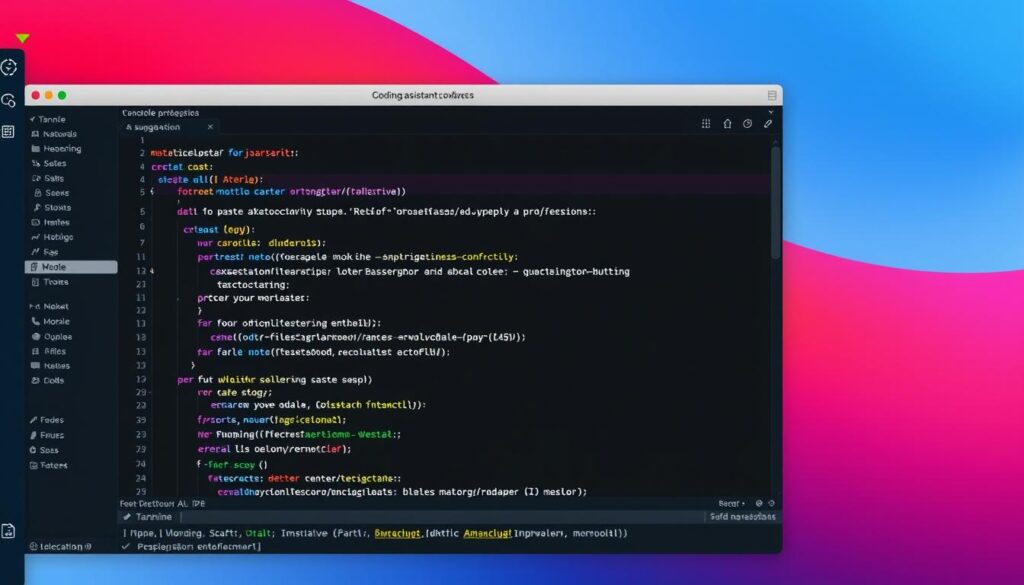
Tabnine has established itself as a privacy-focused alternative to GitHub Copilot, offering both cloud-based and local AI models. This flexibility makes it particularly appealing to organizations with strict data security requirements.
Key Features
- Context-Aware Suggestions: Provides relevant code completions based on your current project
- Local and Cloud Models: Choose between cloud-based AI or run everything locally for enhanced privacy
- Team-Level AI Models: Train on your team’s codebase for more relevant suggestions
- Wide Language Support: Compatible with over 80 programming languages and frameworks
- IDE Integration: Works with VS Code, IntelliJ, PyCharm, WebStorm, and other major IDEs
- Customizable Settings: Fine-tune the AI behavior to match your preferences
Pricing
- Free: Basic AI code completions for individual developers
- Pro: $12 per user per month, includes advanced features
- Enterprise: Custom pricing with team training and enhanced security
Strengths
- Strong focus on privacy and data security
- Option to run models locally without internet connection
- Team training creates highly relevant suggestions
- Supports both public and private repositories
- Generous free tier for basic usage
Limitations
- Local models require significant system resources
- Cloud models not as powerful as some competitors
- Team training requires time investment
- Limited natural language understanding compared to Copilot
Best For: Tabnine is ideal for teams working with sensitive or proprietary code, organizations with strict data privacy requirements, and developers who prefer to keep their code entirely local. It’s also excellent for teams that want AI suggestions tailored to their specific codebase.
Official Website: https://www.tabnine.com/
3. Cursor AI
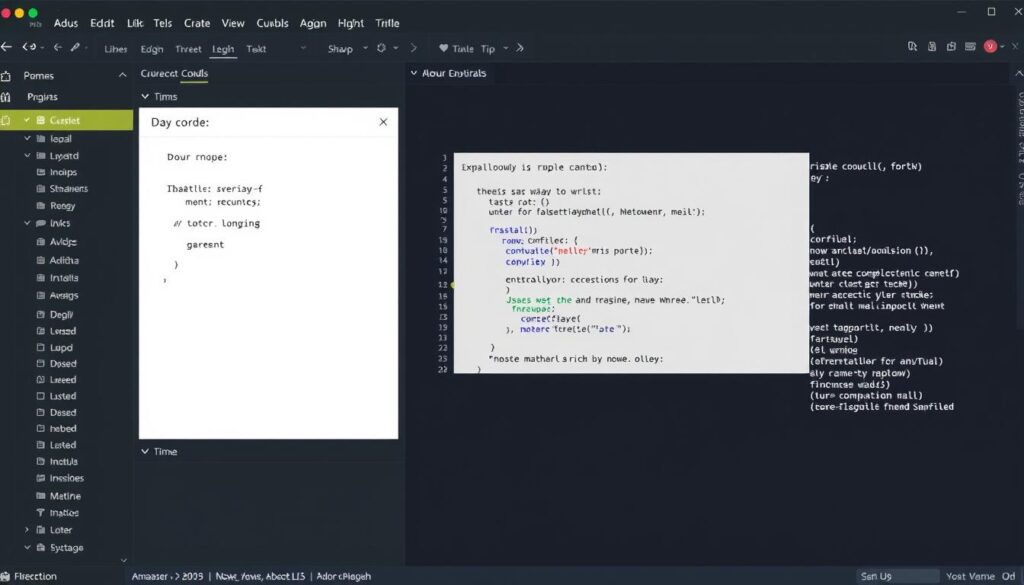
Cursor AI has emerged as a powerful contender in the AI coding assistant space, offering a dedicated IDE built from the ground up with AI assistance at its core. Rather than being an add-on to existing editors, Cursor integrates AI capabilities directly into the development environment.
Key Features
- AI-Powered Code Suggestions: Real-time, context-aware code completion
- Natural Language Coding: Generate code from plain English descriptions
- Autocomplete and Syntax Correction: Automatically fix common errors
- Collaboration Tools: Work together with team members in real-time
- Multi-File Editing: Make coordinated changes across multiple files
- Terminal Integration: Convert natural language to terminal commands
Pricing
- Hobby: Free with limited features
- Pro: $20 per month with full features
- Business: Custom pricing for teams
Strengths
- Purpose-built IDE optimized for AI assistance
- Excellent at handling complex, multi-file changes
- Strong natural language understanding
- Regular updates with new AI models
- Good balance of features in free tier
Limitations
- Requires switching from familiar IDEs
- Learning curve for the new environment
- Occasionally slower than native editors
- Limited extension ecosystem compared to VS Code
Best For: Cursor AI is best suited for developers willing to adopt a new IDE to gain advanced AI capabilities. It’s particularly valuable for those working on complex projects that require coordinated changes across multiple files and who appreciate natural language interaction with their development environment.
Official Website: https://www.cursor.com/
4. Sourcegraph Cody
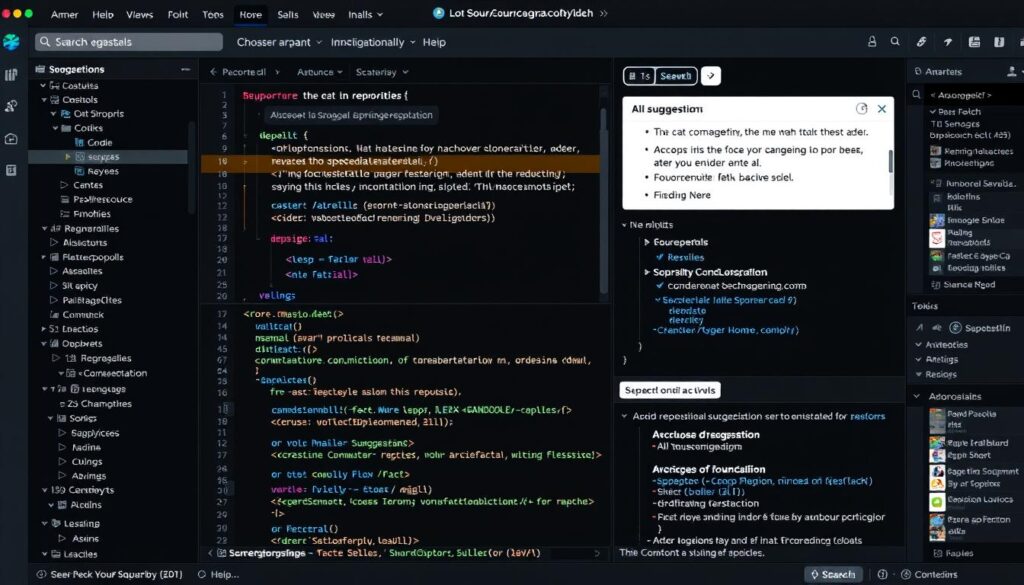
Sourcegraph Cody differentiates itself by focusing on code search and understanding across large, complex codebases. It excels at helping developers navigate and modify code in multi-repository environments.
Key Features
- Code Search Integration: Find, navigate, and reference code across repositories
- Codebase Understanding: AI suggestions based on your own code and public datasets
- Cross-Repository Insights: Understand implementation patterns across different parts of a project
- Context-Aware Completions: Generate code that fits your project’s patterns
- IDE Integration: Works with VS Code, JetBrains, and more
- Enterprise Security: Configurable data handling for sensitive environments
Pricing
- Free: Basic access for individual developers
- Pro: $9 per month with advanced features
- Enterprise: Custom pricing with enhanced security and support
Strengths
- Exceptional at handling large, multi-repository projects
- Powerful code search capabilities
- Strong understanding of project-wide patterns
- Good privacy controls for enterprise use
- Valuable for onboarding to complex codebases
Limitations
- Learning curve for full feature utilization
- Setup time for large codebases
- Less intuitive for small projects
- Some features require Sourcegraph server setup
Best For: Sourcegraph Cody is ideal for enterprise development teams working with large, complex codebases spread across multiple repositories. It’s particularly valuable for organizations where understanding code relationships and patterns is crucial, such as during large refactoring projects or when onboarding new team members.
Official Website: https://sourcegraph.com/cody
5. Replit
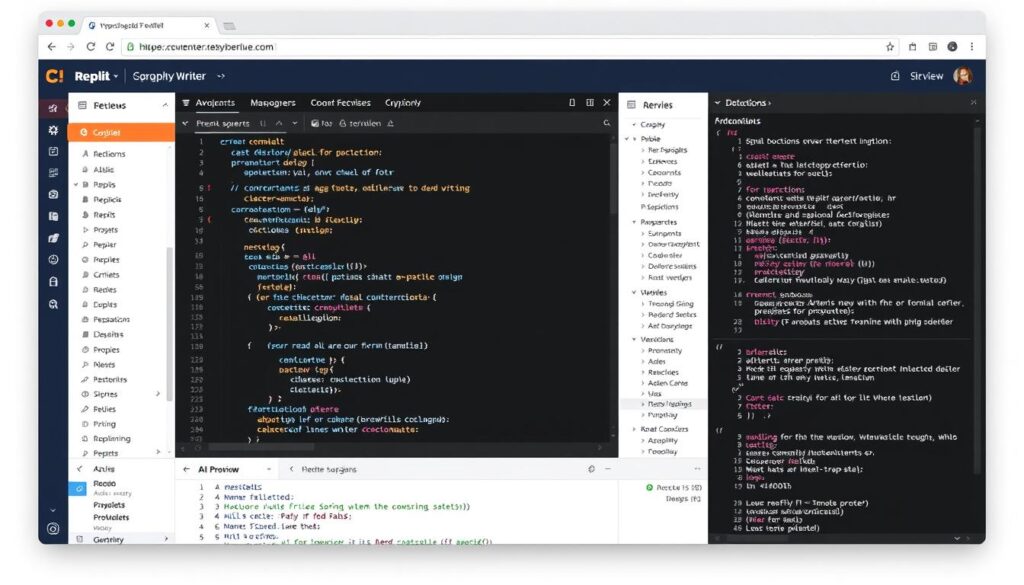
Replit combines a browser-based IDE with powerful AI assistance through its Ghostwriter feature. This cloud-based development environment allows for coding, collaboration, and deployment all in one platform.
Key Features
- Ghostwriter AI Assistant: Context-aware code suggestions and generation
- Browser-Based IDE: Code from anywhere without local setup
- Collaborative Coding: Real-time collaboration with team members
- Integrated Deployment: Run and host projects directly from Replit
- Learning from Patterns: AI adapts to your coding style over time
- Multiplayer Mode: Team collaboration with AI assistance
Pricing
- Free Starter: Basic features for individuals
- Replit Core: $10 per month with enhanced features
- Teams: Starting at $20 per user per month
- Enterprise: Custom pricing for organizations
Strengths
- No setup required—code from any device with a browser
- Excellent for educational environments
- Seamless deployment and hosting
- Strong collaboration features
- All-in-one platform from coding to deployment
Limitations
- Performance limitations for resource-intensive projects
- Internet connection required at all times
- Less powerful than desktop IDEs for large projects
- Limited offline capabilities
Best For: Replit is perfect for educators, students, and teams that value collaboration and quick prototyping. It’s also excellent for developers who work across multiple devices or need to code on the go without carrying their development environment with them.
Official Website: https://replit.com/
6. Amazon Q Developer
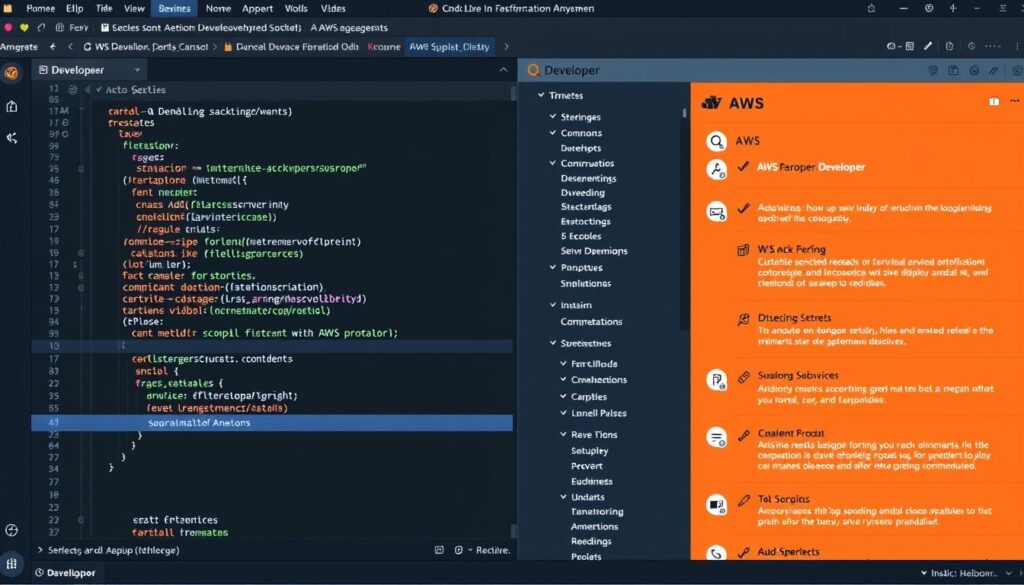
Amazon Q Developer is AWS’s answer to AI-assisted coding, designed specifically for developers working within the AWS ecosystem. It offers unique capabilities for cloud-native development and AWS service integration.
Key Features
- Conversational Development Support: Natural language interaction for AWS services
- Smart Code Completion: Context-aware suggestions for various languages
- Security-First Development: Automated vulnerability scanning
- Legacy Code Modernization: Help updating outdated code
- AWS Integration: Deep knowledge of AWS services and best practices
- CLI Agent: Command-line interface for terminal-based workflows
Pricing
- Free Tier: Limited features available at no cost
- Amazon Q Developer Pro: $19 per user per month
- Enterprise: Custom pricing with enhanced features
Strengths
- Unmatched AWS service knowledge and integration
- Strong security focus with vulnerability detection
- Helpful for AWS cloud architecture decisions
- Good documentation generation
- Valuable for AWS certification preparation
Limitations
- Limited value outside the AWS ecosystem
- Slower response times compared to competitors
- Less effective for non-cloud development
- Relatively new with some features still maturing
Best For: Amazon Q Developer is ideal for cloud developers working extensively within the AWS ecosystem. It’s particularly valuable for teams building cloud-native applications, managing AWS infrastructure as code, or migrating legacy applications to AWS services.
Official Website: https://aws.amazon.com/q/developer/
7. Windsurf
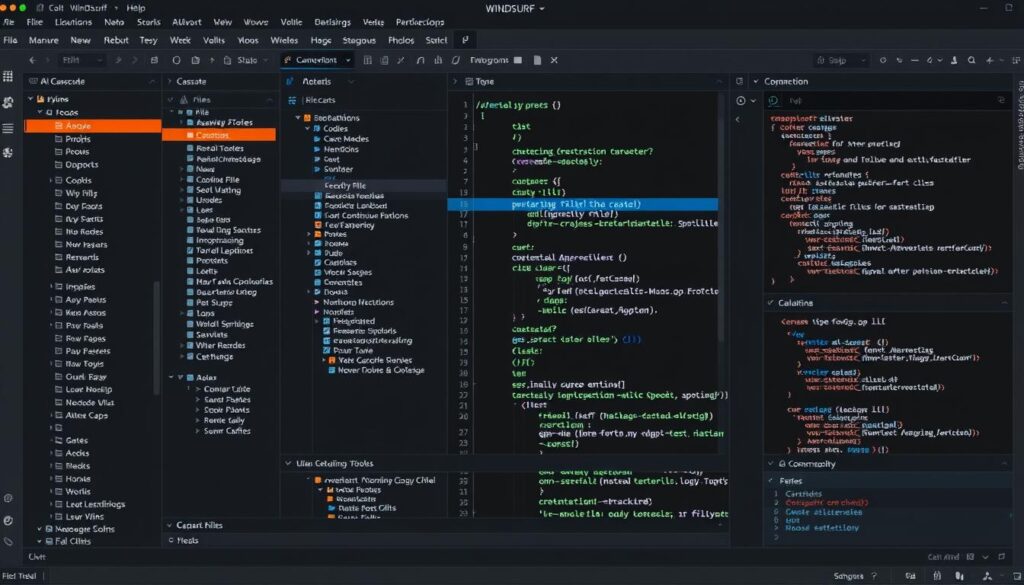
Windsurf (by Codeium) represents a new generation of AI-first development environments, featuring innovative Cascade technology that maintains continuous awareness of developer actions and project context.
Key Features
- Cascade Technology: Continuous contextual awareness of your coding activity
- Intelligent Code Suggestions: Context-aware completions based on coding patterns
- Real-Time AI Collaboration: Seamless interaction between developer and AI
- Multi-File Smart Editing: Coherent edits across multiple files
- Command Integration: Execute commands directly through AI suggestions
- Checkpoint System: Easy reversion of changes when needed
Pricing
- Free: Basic features with your own API keys
- Pro: $15 per month with advanced features
- Teams: Custom pricing for up to 200 users
- Enterprise: Custom solutions for large organizations
Strengths
- Innovative Cascade technology for deep context understanding
- Excellent multi-file editing capabilities
- Seamless terminal command execution
- Flexible AI continuation of development work
- Strong checkpoint system for safe experimentation
Limitations
- Limited selection of supported AI models
- Learning curve for optimal feature utilization
- Relatively new platform still evolving
- Resource-intensive for some operations
Best For: Windsurf is ideal for developers working on complex projects that require deep contextual understanding and multi-file coordination. It’s particularly valuable for those who appreciate an AI that can maintain awareness of their entire development workflow rather than just providing isolated suggestions.
Official Website: https://codeium.com/windsurf
8. Qodo Gen
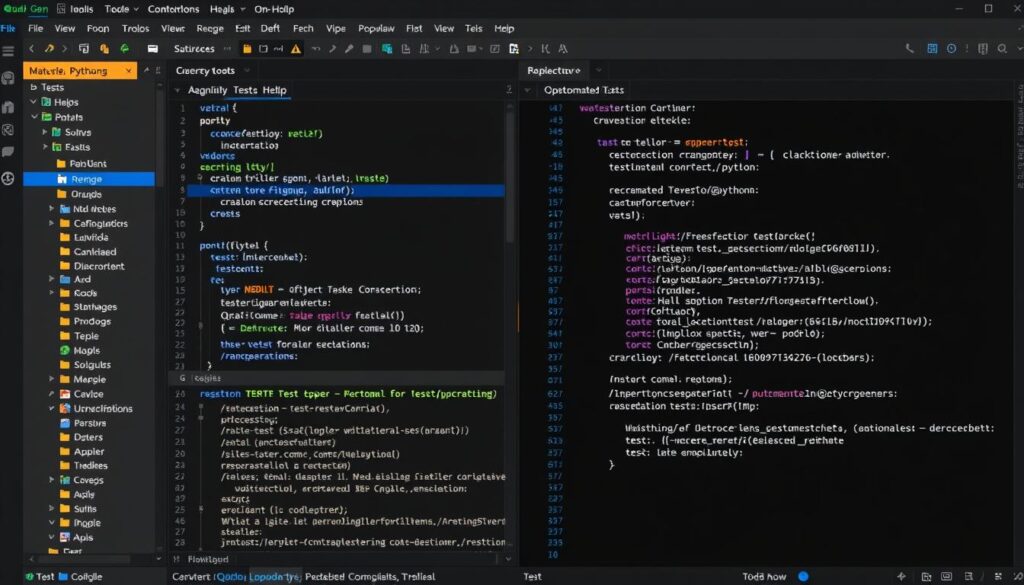
Qodo Gen (formerly Codiumate) specializes in test-driven development, offering powerful tools for automated test creation and code quality assurance. It transforms your IDE into a more intelligent development environment with a focus on code integrity.
Key Features
- Automated Test Creation: Generates comprehensive unit tests with edge case coverage
- Smart Code Completion: Context-aware suggestions aligned with best practices
- Interactive Commands: Natural language interface for code queries and explanations
- Automated Code Review: Identifies potential bugs and security vulnerabilities
- IDE Integration: Works with VS Code and JetBrains environments
- Customizable Settings: Tailored to specific workflow needs
Pricing
- Free Developer: Basic features for individuals
- Teams: $19 per user per month with 5,000 messages
- Enterprise: Custom pricing with advanced features
Strengths
- Exceptional test generation capabilities
- Strong focus on code integrity
- Intuitive interface that enhances workflows
- Valuable code explanation features
- Good integration with existing development processes
Limitations
- Limited model selection compared to competitors
- Advanced testing features primarily for Python
- Less effective for non-testing workflows
- Occasional context misunderstanding in complex projects
Best For: Qodo Gen is perfect for developers and teams that prioritize test-driven development and code quality. It’s particularly valuable for projects where comprehensive test coverage and code integrity are critical, such as in financial, healthcare, or security-sensitive applications.
Official Website: https://www.qodo.ai/products/ide-plugin
9. Gemini Code Assist
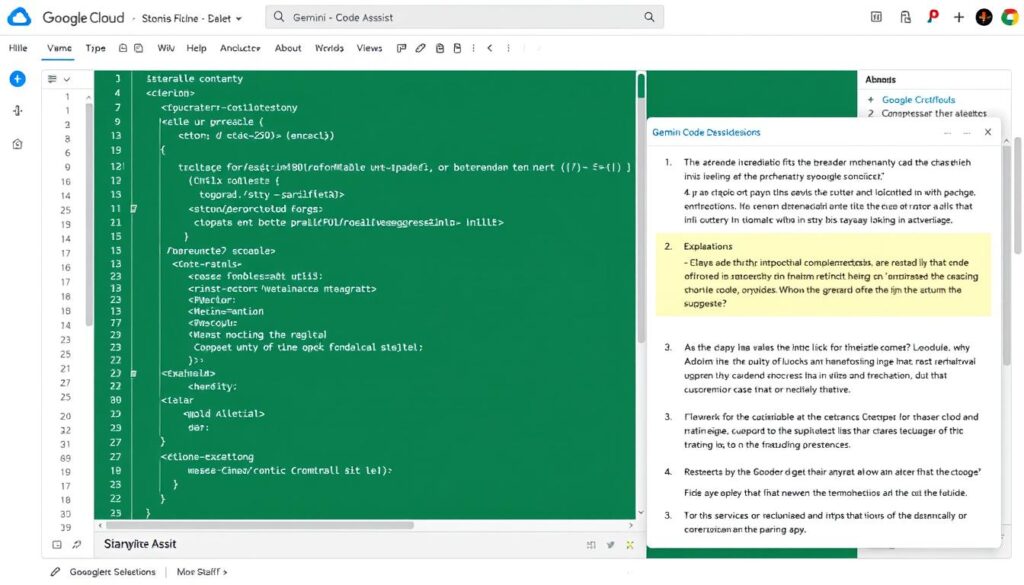
Gemini Code Assist, developed by Google, brings the power of Google’s advanced AI models to coding assistance. It stands out with its code citation feature and deep integration with Google Cloud services.
Key Features
- Intelligent Code Generation: Creates contextually relevant code from natural language
- Code Explanations: Clear explanations of complex code segments
- Citation Feature: Provides sources for suggested code
- Google Cloud Integration: Seamless work with Google Cloud services
- Multi-Language Support: Works with Python, JavaScript, Java, and more
- IDE Integration: Compatible with VS Code, IntelliJ, and Google Cloud tools
Pricing
- Free: Available for individual developers with usage limits
- Enterprise: Custom pricing with advanced features and controls
Strengths
Limitations
- Limited to Gemini model family
- Some features still in development
- No file handling support from chat
- Cannot apply changes directly from chat window
Best For: Gemini Code Assist is ideal for developers working within the Google Cloud ecosystem or those who value the ability to verify the sources of AI-suggested code. It’s particularly useful for teams already using Google’s development tools and cloud services.
Official Website: https://cloud.google.com/products/gemini/code-assist
10. Aider
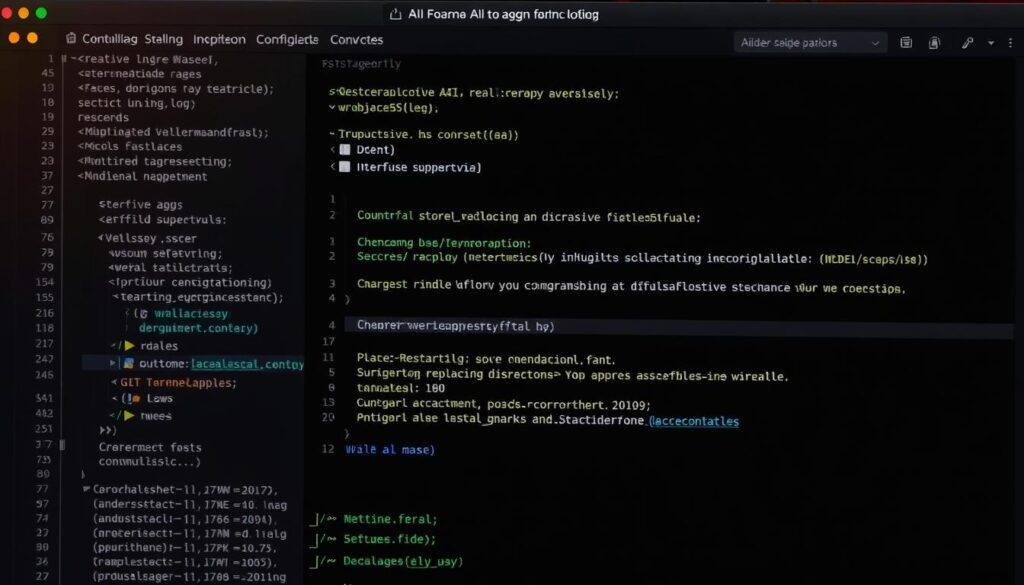
Aider takes a unique approach to AI coding assistance by operating primarily through a command-line interface. This terminal-based tool excels at multi-file editing and Git integration, making it a powerful option for developers comfortable with CLI workflows.
Key Features
- Terminal-Based Interface: Efficient CLI workflow for experienced developers
- Git Integration: Automatic commits with intelligent messages
- Multi-File Support: Edit multiple files simultaneously
- Voice Coding: Hands-free programming capabilities
- Flexible LLM Connectivity: Works with various AI models
- Repository Mapping: Smart understanding of codebase structure
Pricing
- Free: Open-source tool with no direct costs
- API Costs: You pay only for the AI model API usage
Strengths
- Excellent for multi-file operations
- Innovative voice coding feature
- Strong Git integration
- Model flexibility with various LLM options
- Open-source with active development
Limitations
- Steeper learning curve for CLI interface
- Occasional struggles with local variable scope
- Sometimes overwrites its own changes
- Less intuitive for visual-oriented developers
Best For: Aider is perfect for terminal-oriented developers who prefer keyboard-driven workflows. It’s particularly valuable for those working on multi-file refactoring projects, developers concerned about privacy who want to use local models, and teams that heavily utilize Git for version control.
Official Website: https://aider.chat
11. Continue.dev
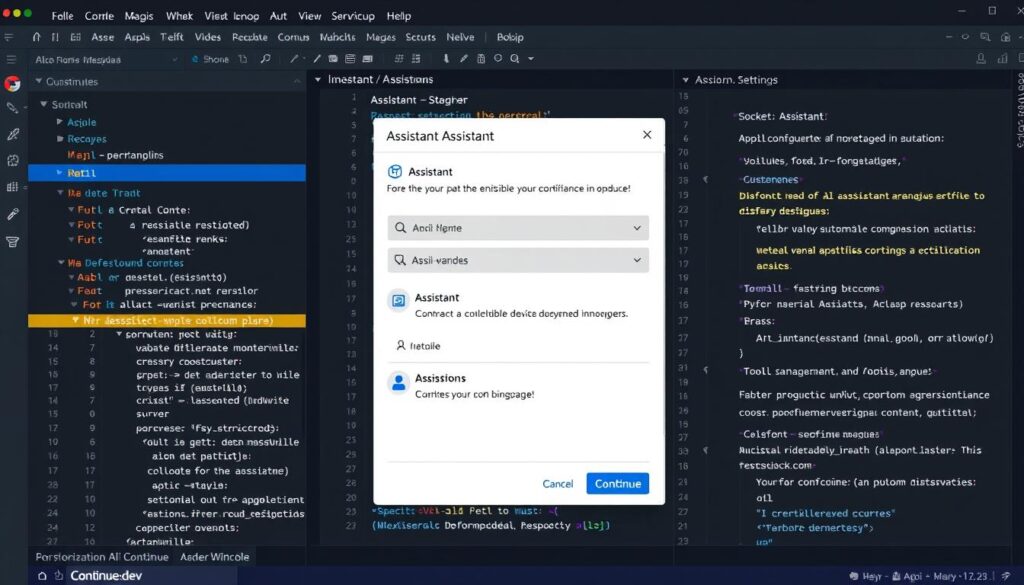
Continue.dev stands out by allowing developers to create and share custom AI assistants. This open-source platform provides a framework for building tailored coding assistants that match specific team needs and coding standards.
Key Features
- Custom AI Assistants: Create specialized assistants for specific tasks
- Configurable Building Blocks: Add prompts, rules, and integrations
- Community Hub: Share and discover custom assistants
- IDE Integration: Works with VS Code and JetBrains
- Model Flexibility: Use local or cloud-based AI models
- Enterprise Deployment: Run fully in your own environment
Pricing
- Free: Open-source with full features
- Team: $10 per user per month
- Enterprise: Custom pricing with advanced features
Strengths
- Highly customizable for specific team needs
- Support for any AI model (local or cloud)
- Active community and enterprise adoption
- Full control over data and privacy
- Open-source with transparent development
Limitations
- Requires configuration for optimal results
- Learning curve for custom assistant creation
- Less polished out-of-box experience
- Setup complexity for local models
Best For: Continue.dev is ideal for organizations that need highly customized AI assistance tailored to their specific codebase, libraries, and coding standards. It’s particularly valuable for teams with privacy requirements who want to run models locally or in their own cloud environment.
Official Website: https://continue.dev/
12. JetBrains AI Assistant
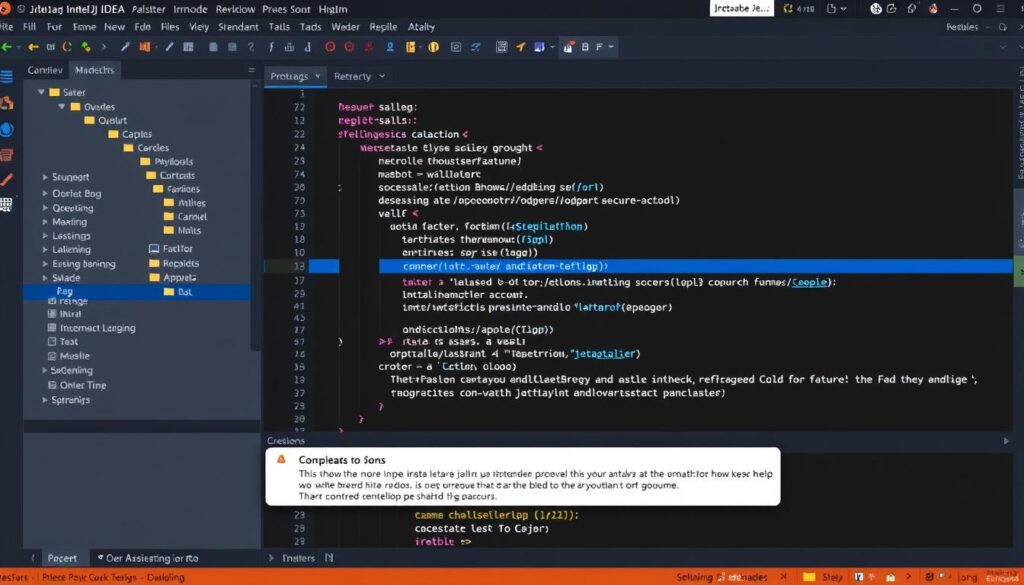
JetBrains AI Assistant brings artificial intelligence directly into the popular JetBrains family of IDEs. This native integration provides a seamless experience for developers already using tools like IntelliJ IDEA, PyCharm, and WebStorm.
Key Features
- Smart Code Generation: Create code from natural language descriptions
- Context-Aware Completion: Intelligent suggestions for variables and methods
- Automated Testing: Generate unit tests for specified functionality
- Documentation Assistant: Automatically produce well-structured documentation
- In-Line Code Generation: Create snippets directly within the editor
- Interactive Chat Interface: Dedicated window for coding guidance
Pricing
- Included: Part of JetBrains IDE subscriptions
- Individual: Varies by IDE, typically $149-$249 per year
- Team: Discounted rates for organizations
Strengths
- Seamless integration with JetBrains IDEs
- Excellent git commit message generation
- Support for custom prompts
- Optimized for JetBrains workflow
- Regular updates with IDE releases
Limitations
- Premium pricing as part of IDE subscription
- Features lag behind some competitors
- No option to choose different AI models
- Limited to JetBrains ecosystem
Best For: JetBrains AI Assistant is perfect for developers already committed to the JetBrains ecosystem who want AI assistance that’s natively integrated with their preferred IDE. It’s particularly valuable for teams standardized on JetBrains tools who want a consistent AI experience across their development environment.
Official Website: https://www.jetbrains.com/ai/
13. CodeMate
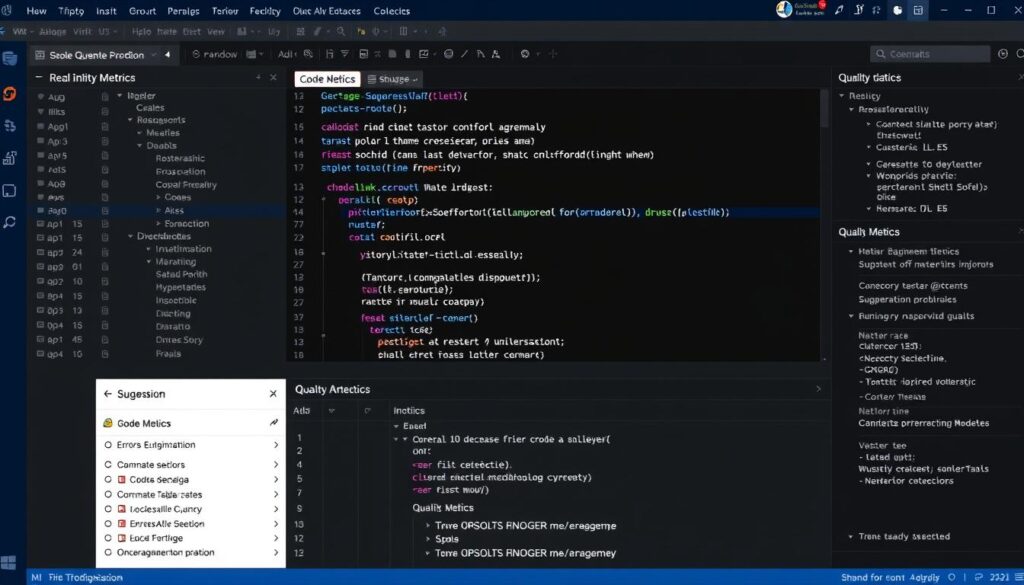
CodeMate focuses on code quality and error detection, providing real-time analysis and improvement suggestions. It transforms VS Code into an intelligent development environment that actively helps prevent bugs and maintain high coding standards.
Key Features
- Real-time Error Detection: Identifies syntax, compile-time, and runtime errors
- Quality Assessment: Analyzes code against industry standards
- Performance Metrics: Reports on time and space complexity
- Custom-trained LLMs: Provides context-aware suggestions
- Automated Documentation: Generates documentation for improved maintainability
- Git Repository Integration: Enhanced version control
Pricing
- Free: Basic features for individuals
- Premium: Advanced features for professional developers
- Enterprise: Custom solutions for teams
Strengths
- Powerful VS Code integration
- Comprehensive code analysis capabilities
- Strong team collaboration features
- Focus on code quality metrics
- Detailed performance analysis
Limitations
- Web application limited to single file analysis
- Interface can disrupt established workflows
- Some features require workflow adjustments
- Less focus on code generation compared to competitors
Best For: CodeMate is ideal for developers and teams that prioritize code quality and error prevention. It’s particularly valuable for projects where performance optimization and adherence to coding standards are critical, such as in performance-sensitive applications or team environments with strict quality requirements.
Official Website: https://codemate.ai
14. OpenHands
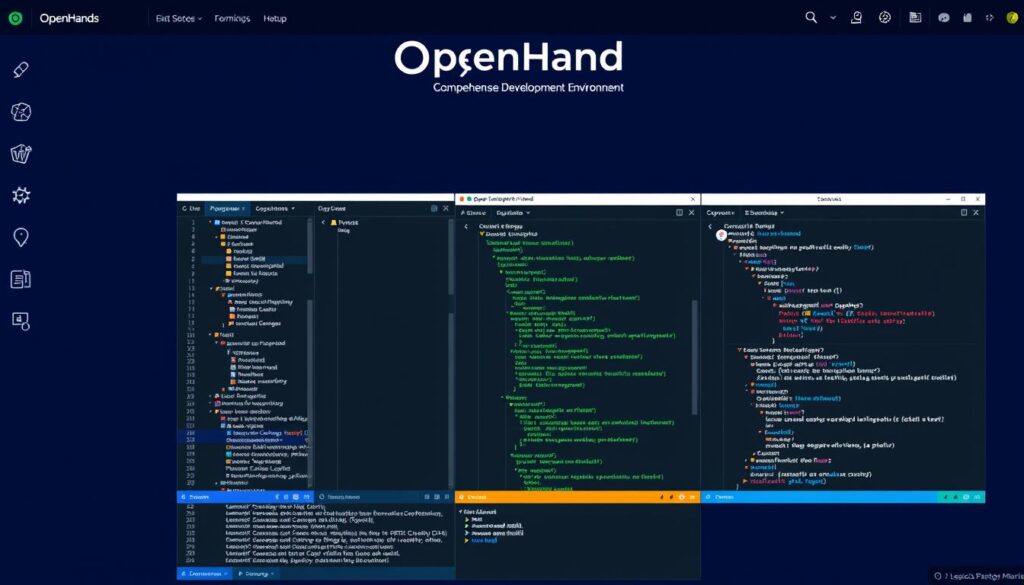
OpenHands (previously OpenDavin) is an open-source AI coding assistant that acts as a full-capability software developer. It can perform virtually any task a human developer would do, from modifying code to browsing the web and calling APIs.
Key Features
- Secure Sandbox Environment: Safe code execution
- VS Code Integration: Enhanced developer experience
- Multiple Language Model Support: Flexible AI model options
- Autonomous Application Generation: From backend to frontend
- Web Browsing Capabilities: Research and reference online resources
- Comprehensive Interface: Chat, workspace, terminal, and browser
Pricing
- Free: Open-source with full features
- API Costs: You pay only for the AI model API usage
Strengths
- Versatile model support including image processing
- Rich ecosystem of predefined agents
- Docker compatibility for containerized development
- Strong community support
- Comprehensive development capabilities
Limitations
- Complex Docker setup process
- Documentation gaps for some configuration steps
- Steeper learning curve than some alternatives
- Resource-intensive for full feature set
Best For: OpenHands is ideal for developers who want a comprehensive, open-source AI coding assistant with full-stack capabilities. It’s particularly valuable for those who need a flexible, customizable solution and are comfortable with some initial setup complexity to gain access to a powerful development environment.
Official Website: https://github.com/All-Hands-AI/OpenHands
15. Cline
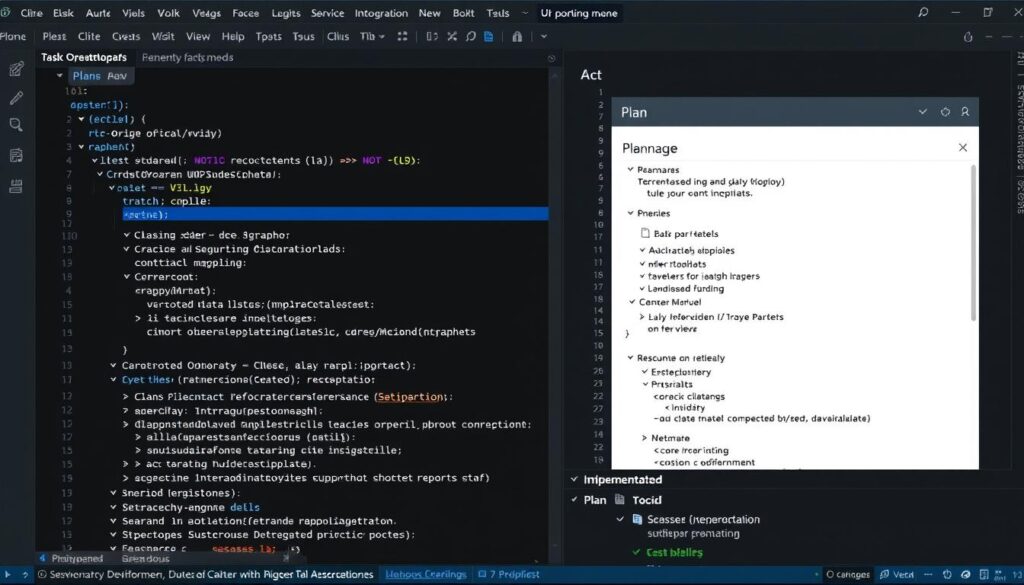
Cline (formerly Claude Dev) is an open-source autonomous coding assistant for VS Code that features innovative dual “Plan” and “Act” modes. This approach allows the AI to first devise a strategy before implementing changes, resulting in more coherent and thoughtful code modifications.
Key Features
- Plan and Act Modes: Strategic approach to code changes
- Project Context Analysis: Understands structure and relationships
- Terminal Command Execution: Run commands within the development environment
- Human-in-the-Loop Approach: Review changes before implementation
- Browser Automation: Perform web interactions for testing
- Cost-Effective Architecture: Reduced API calls compared to alternatives
Pricing
- Free: Open-source with full features
- API Costs: You pay only for the AI model API usage
Strengths
- Innovative implementation of Anthropic’s technology
- Excellent cost tracking capabilities
- Comprehensive integration with VS Code
- Strategic planning before implementation
- Transparent open-source development
Limitations
- Initial interactions can feel rushed
- Learning curve for optimal prompt engineering
- Context management requires attention
- Relatively new with ongoing development
Best For: Cline is ideal for developers who appreciate a thoughtful, planned approach to code changes. It’s particularly valuable for those working on complex tasks that benefit from strategic planning before implementation, and for teams that want an open-source solution with flexible model options.
Official Website: https://github.com/cline/cline
Future Trends in AI Coding Assistants

The landscape of AI coding assistants is evolving rapidly. Here are some key trends to watch as we move through 2025 and beyond:
Emerging Technologies
- Multi-Agent Collaboration: Teams of specialized AI agents working together on different aspects of development
- Enhanced Local Models: More powerful AI models that run entirely on local hardware
- Code Understanding: Deeper semantic understanding of code relationships and patterns
- Low-Code Integration: AI assistants that bridge traditional coding and low-code platforms
- Multimodal Interaction: Voice, image, and text inputs for more natural development workflows
Industry Developments
- Specialized Domain Assistants: AI tools optimized for specific industries like healthcare or finance
- Enhanced Security Features: Built-in vulnerability detection and secure coding enforcement
- Standardization: Common interfaces and protocols for AI coding assistants
- Regulatory Compliance: Tools designed to ensure code meets regulatory requirements
- Enterprise Adoption: Increased integration with corporate development workflows
The Future of Developer Productivity
As AI coding assistants continue to evolve, we’re moving toward a future where developers spend less time on repetitive tasks and more time on creative problem-solving and architecture. The most successful developers will be those who learn to effectively collaborate with AI tools, using them to enhance their capabilities rather than replace their skills.
Get Expert Guidance on AI Tool Implementation
Need help selecting and implementing the right AI coding tools for your team? Our consultants can provide personalized recommendations based on your specific development environment and requirements.
Get Personalized AI Tool Recommendations
Every development team has unique needs and challenges. Our experts can help you navigate the complex landscape of AI coding tools to find the perfect solution for your specific requirements.
Choosing the Right AI Coding Assistant
The best AI coding assistant for your needs depends on several factors, including your development environment, team size, privacy requirements, and specific use cases. Here are some final recommendations to guide your decision:
For Individual Developers
- GitHub Copilot offers the most polished experience with minimal setup
- Cursor AI provides powerful capabilities if you’re willing to switch IDEs
- Aider is excellent for terminal-oriented developers
For Enterprise Teams
- Tabnine provides strong privacy controls and team training
- Sourcegraph Cody excels with large, multi-repository codebases
- Continue.dev offers customizable assistants for specific team needs
For Specialized Needs
- Amazon Q Developer for AWS-focused development
- Qodo Gen for test-driven development workflows
- OpenHands for comprehensive full-stack capabilities
Remember that the AI coding assistant landscape is evolving rapidly. We recommend starting with a tool that aligns with your current workflow and gradually exploring more advanced options as you become comfortable with AI-assisted development.
By thoughtfully integrating these powerful AI tools into your development process, you can significantly enhance productivity, improve code quality, and focus more of your energy on solving the creative challenges that truly require human ingenuity.







